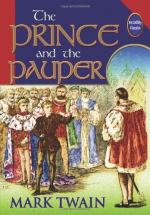“What is thy name, lad?”
“Tom Canty, an’ it please thee, sir.”
“’Tis an odd one. Where dost live?”
“In the city, please thee, sir. Offal Court, out of Pudding Lane.”
“Offal Court! Truly ’tis another odd one. Hast parents?”
“Parents have I, sir, and a grand-dam likewise that is but indifferently precious to me, God forgive me if it be offence to say it—also twin sisters, Nan and Bet.”
“Then is thy grand-dam not over kind to thee, I take it?”
“Neither to any other is she, so please your worship. She hath a wicked heart, and worketh evil all her days.”
“Doth she mistreat thee?”
“There be times that she stayeth her hand, being asleep or overcome with drink; but when she hath her judgment clear again, she maketh it up to me with goodly beatings.”
A fierce look came into the little prince’s eyes, and he cried out—
“What! Beatings?”
“Oh, indeed, yes, please you, sir.”
“Beatings!—and thou so frail and little. Hark ye: before the night come, she shall hie her to the Tower. The King my father”—
“In sooth, you forget, sir, her low degree. The Tower is for the great alone.”
“True, indeed. I had not thought of that. I will consider of her punishment. Is thy father kind to thee?”
“Not more than Gammer Canty, sir.”
“Fathers be alike, mayhap. Mine hath not a doll’s temper. He smiteth with a heavy hand, yet spareth me: he spareth me not always with his tongue, though, sooth to say. How doth thy mother use thee?”
“She is good, sir, and giveth me neither sorrow nor pain of any sort. And Nan and Bet are like to her in this.”
“How old be these?”
“Fifteen, an’ it please you, sir.”
“The Lady Elizabeth, my sister, is fourteen, and the Lady Jane Grey, my cousin, is of mine own age, and comely and gracious withal; but my sister the Lady Mary, with her gloomy mien and—Look you: do thy sisters forbid their servants to smile, lest the sin destroy their souls?”
“They? Oh, dost think, sir, that they have servants?”
The little prince contemplated the little pauper gravely a moment, then said—
“And prithee, why not? Who helpeth them undress at night? Who attireth them when they rise?”
“None, sir. Would’st have them take off their garment, and sleep without—like the beasts?”
“Their garment! Have they but one?”
“Ah, good your worship, what would they do with more? Truly they have not two bodies each.”
“It is a quaint and marvellous thought! Thy pardon, I had not meant to laugh. But thy good Nan and thy Bet shall have raiment and lackeys enow, and that soon, too: my cofferer shall look to it. No, thank me not; ’tis nothing. Thou speakest well; thou hast an easy grace in it. Art learned?”




